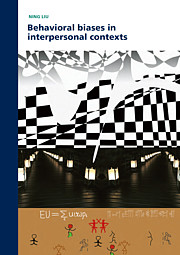Behavioral biases in interpersonal contexts Defended on Friday, 3 February 2017
This thesis presents evidence suggesting that the same types of biases in individual decision making under uncertainty pertain in interpersonal contexts. The chapters above demonstrate in specific contexts how specific interpersonal factors attenuate, amplify, or replicate these biases.
One of the most natural interpersonal contexts is group decision making. The group effects on decisions consist of aggregation and communication, and disentangling these could help us improve our understanding of the group decision making process and make better predictions. Because the two measures of rationality applied in Chapter 2, namely stochastic dominance and EU-compliance, are both dichotomous, we use the simulated decisions from pure voting as benchmarks to isolate the communication effects.
Chapter 3 describes how simple pieces of information were provided to individuals, with the aim of helping them evaluate the quality of the estimates they received in interpersonal communication. Chapter 4 extends Yaari's definition of comparative risk aversion to enable comparisons between people holding different beliefs. The last chapter presents evidence that the mere presentation with cash could make a substantial psychological impact on people's risk attitudes by changing their likelihood insensitivity in probability weighting. The cash effects that lower valuations could potentially come from a buyer's evolutionary instinct in bargaining triggered by cash. Testing the existence of such instincts and, if they exist, finding what triggers them could be complementary to the current study.
Keywords
Allais paradox, Communication, Group decision making, Information, Probability weighting, Risk, Source-preferences, Uncertainty.











